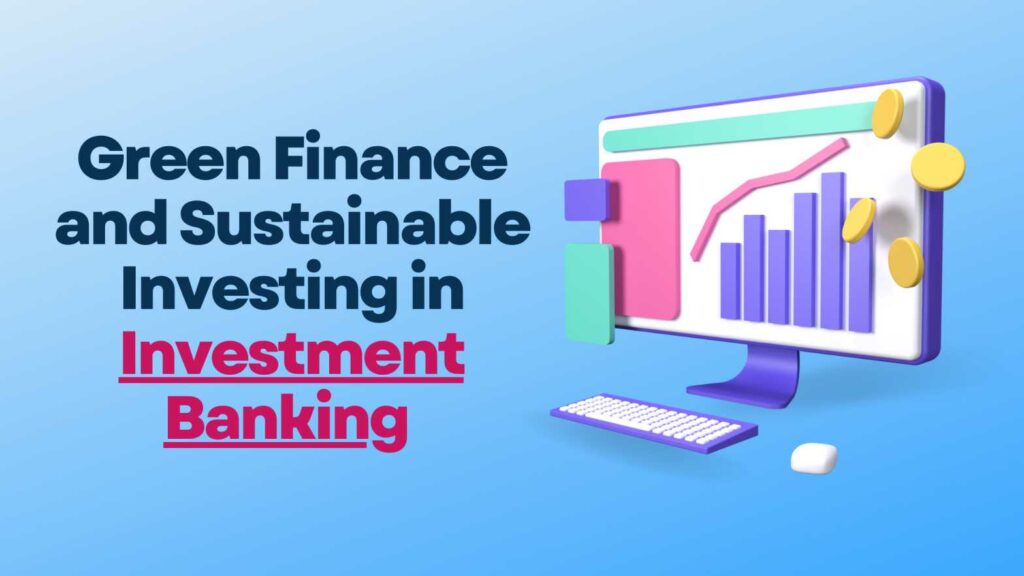Investors ensure financial success by using various strategies for building and diversifying their financial portfolios. Green finance and sustainable investing in investment banking are increasingly attracting the attention of investors and businesses alike.
Before we dive into the details of green finance and sustainable investing, their features, and advantages, let us understand what these terms mean.
What is Green Finance?
Climate change is probably this century's most defining economic and political issue and is here to stay for a while. Investors, governments, individuals, and businesses are taking action to combat the climate issue, particularly decarbonisation techniques.
Green finance refers to investments or loans which promote environmentally-positive activities. This includes the construction of green infrastructure, purchasing eco-friendly goods and services, etc. Green finance is a mainstream phenomenon now protecting from ecologically destructive services and products.
What is Sustainable Investing in Investment Banking?
Sustainable investing refers to different practices where investors and businesses look to achieve financial returns and promote long-term social and environmental values.
Investors make better investment decisions and generate comprehensive analyses by combining environmental, social, and corporate governance (ESG) insights with conventional investment approaches.
Sustainable investment in investment banking sees that business firms are judged not based on financial profits but on how and what they contribute to society.
Understanding the ESG Factors in Sustainable Investing
The sustainability impact of an investment is evaluated using ESG factors. A typical ESG score consists of the following factors:
-
Environmental
This includes the impact of a company on the environment. It includes water use, conservation, waste, carbon footprint, and clean technology that it creates and uses in its supply chain.
-
Social
This is how a company or a business impacts society and how it calls for social change and good. Analysts keep a close watch and examine the stances and involvement of the business on various social issues.
These issues include community engagement, human rights, employees' health and safety, and racial diversity within inclusion and hiring programmes.
-
Governance
Here we will see how a company or an exchange-traded fund (ETF) is ‘governed’ or managed to bring in positive change.
This includes reviewing executive compensation and diversity, management and governing board quality, overall transparency and disclosure, shareholder rights, corporate political contributions, and anti-corruption.
Along with ESG factors for sustainable investing, investors can also use other additional strategies. Some of them are as follows:
-
Impact Investing
Impact investing implies targeted investments aimed at solving environmental and social problems. Community investing is an integral part of impact investing.
This capital is directed to underserved communities and individuals. Businesses working with clear environmental and social purposes also receive financing from impact investing.
-
Activist Investing
Activist investing is purchasing company equity to change how it operates. Moral values often guide investment decisions or social or environmental causes that companies and their leaders believe in or think deeply about.
For instance, individuals caring about global warming might show interest in a company that drives environmental change.
Benefits of Green Finance
Undoubtedly, green finance brings environmental and economic benefits and advantages to everybody. It successfully transitions to a low-carbon society, resulting in socially inclusive growth.
Let us take a look at some of the benefits of green finance.
-
Helps in adding business value
Businesses have a portfolio that they have to maintain and enhance. Green finance helps in enhancing the portfolio value of a business. Along with offering a green edge, the business can draw the attention of more environmentally-concerned customers and investors.
-
Encourages the development of environment-friendly infrastructure and the spread of technologies
Governments create and develop infrastructure in most developing countries to improve long-term resource management. There are also attempts to channel the money from private sectors into local green markets. This step in investment banking provides a competitive edge to the business.
-
Improves economic prospects
Governments of countries promoting green financing help in protecting societies from resource scarcity. They build and encourage local markets for renewable sources of energy. They also work towards entering new markets, which have high employment potential.
Conclusion
If you are looking to move up in your career in investment banking, you must learn the skills of green finance and sustainable investing. These new trends are taking the investment banking industry by storm, and their benefits for the economy, society, and environment at large cannot be overlooked.
A professional investment banking course will pave the way for you to become an investment banker who is highly successful. Imarticus Learning offers a Certified Investment Banking Operations Professional programme for interested candidates. This certification in investment banking is ideal for finance graduates with 0-3 years of working experience.
Along with a interview guarantee, the course offers live training modules, experiential learning, job-specific skills, extensive career support, and globally-accredited certification. A plethora of job opportunities open up on completion of the course.
Visit Imarticus for further details.











